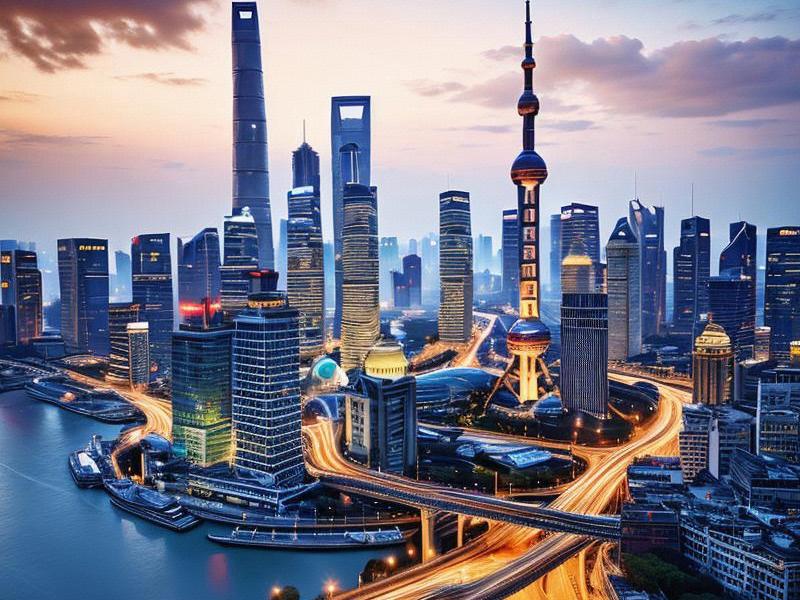
Shanghai, the largest city in China, is a vibrant metropolis that has captured the world's attention. Once a humble fishing village, it has grown into a global economic hub, a cultural melting pot, and a symbol of China's rapid modernization. This article will explore the various facets of Shanghai, highlighting its economic achievements, cultural diversity, and urban development.
Economic Powerhouse
Shanghai's economic success is nothing short of remarkable. Over the past few decades, the city has transformed itself into one of the world's leading financial centers. The Shanghai Stock Exchange (SSE) is one of the largest stock exchanges in Asia, attracting investors from around the globe. The city's port, the Port of Shanghai, is the busiest container port in the world, handling millions of containers annually. This logistical prowess has made Shanghai a critical node in global trade networks.
The city's economic growth is driven by a combination of factors, including its strategic location, robust infrastructure, and a business-friendly environment. Shanghai benefits from its proximity to the Yangtze River Delta, one of the most economically developed regions in China. The city's well-developed transportation network, which includes two major international airports, the Maglev train, and an extensive metro system, facilitates seamless connectivity both domestically and internationally.
Moreover, Shanghai has established itself as a hub for multinational corporations. Many global companies have set up their regional headquarters in the city, drawn by its favorable business climate and access to a vast consumer market. The city's Pudong district, in particular, has become synonymous with high-tech industries, financial services, and luxury shopping. The iconic Lujiazui Financial District, home to the Shanghai Tower, the second-tallest building in the world, is a testament to the city's economic ambition.
上海龙凤419手机 Cultural Melting Pot
Beyond its economic achievements, Shanghai is renowned for its cultural diversity and rich heritage. The city is a blend of traditional Chinese culture and Western influences, reflecting its history as a gateway to the West. This unique cultural tapestry is evident in the city's architecture, cuisine, and arts scene.
Shanghai's architecture is a visual representation of its history. The Bund, a waterfront area along the Huangpu River, is lined with colonial-era buildings that bear witness to the city's past as a treaty port. In contrast, the Pudong skyline showcases the city's modernity, with skyscrapers like the Oriental Pearl Tower and the Shanghai Tower dominating the horizon. These architectural landmarks symbolize the harmonious coexistence of tradition and modernity in Shanghai.
Culinary diversity is another hallmark of Shanghai. The city is famous for its Shanghainese cuisine, which features delicate flavors, fresh ingredients, and unique cooking techniques. Dishes like Xiaolongbao (soup dumplings), Shengjianbao (pan-fried buns), and Lion's Head meatballs are beloved by locals and tourists alike. In addition to traditional Shanghainese food, Shanghai boasts a wide array of international cuisines, thanks to its cosmopolitan population.
The arts scene in Shanghai is equally vibrant. The city hosts numerous cultural festivals, art exhibitions, and music concerts throughout the year. The Shanghai International Film Festival, one of the oldest and most prestigious film festivals in Asia, attracts filmmakers and audiences from around the world. The city's museums, such as the Shanghai Museum and the Power Station of Art, showcase a rich collection of art and artifacts, ranging from ancient Chinese calligraphy to contemporary installations.
上海龙凤419体验 Urban Development and Sustainability
Shanghai's rapid urban development has been a subject of global interest. The city has undergone significant transformations in the past few decades, with new skyscrapers, modern infrastructure, and green spaces springing up across the metropolis. However, urbanization has also brought challenges, such as traffic congestion, air pollution, and housing shortages.
To address these challenges, Shanghai has embraced sustainable urban development. The city has implemented various initiatives to promote green energy, reduce carbon emissions, and improve public transportation. For instance, Shanghai has invested heavily in renewable energy projects, including solar and wind power installations. The city's metro system, which now has over 17 lines and serves millions of passengers daily, is a model of efficient public transportation.
Shanghai has also prioritized environmental conservation efforts. The city has established numerous parks and green spaces, such as the Century Park and the Xintiandi Ecological Park, to enhance the quality of life for its residents. Additionally, the city has implemented strict regulations to control industrial emissions and promote energy-efficient building designs.
上海娱乐联盟 Global Influence and Future Prospects
Shanghai's global influence extends beyond its economic and cultural achievements. The city plays a pivotal role in China's Belt and Road Initiative (BRI), a massive infrastructure project aimed at enhancing connectivity and trade between Asia, Europe, and Africa. As a key node in the BRI, Shanghai is poised to benefit from increased international cooperation and investment.
The city's future prospects are bright, with continued economic growth, cultural innovation, and urban development. Shanghai is committed to becoming a global leader in sustainability, smart cities, and technological advancements. The city's Vision 2040 plan outlines ambitious goals for sustainable urban development, including the creation of a low-carbon economy, the promotion of digital innovation, and the enhancement of quality of life for its residents.
In conclusion, Shanghai is a dynamic and multifaceted city that embodies the spirit of modern China. Its economic prowess, cultural diversity, and urban development make it a global powerhouse and a beacon of opportunity. As Shanghai continues to evolve, it will undoubtedly play a crucial role in shaping the future of China and the world.
